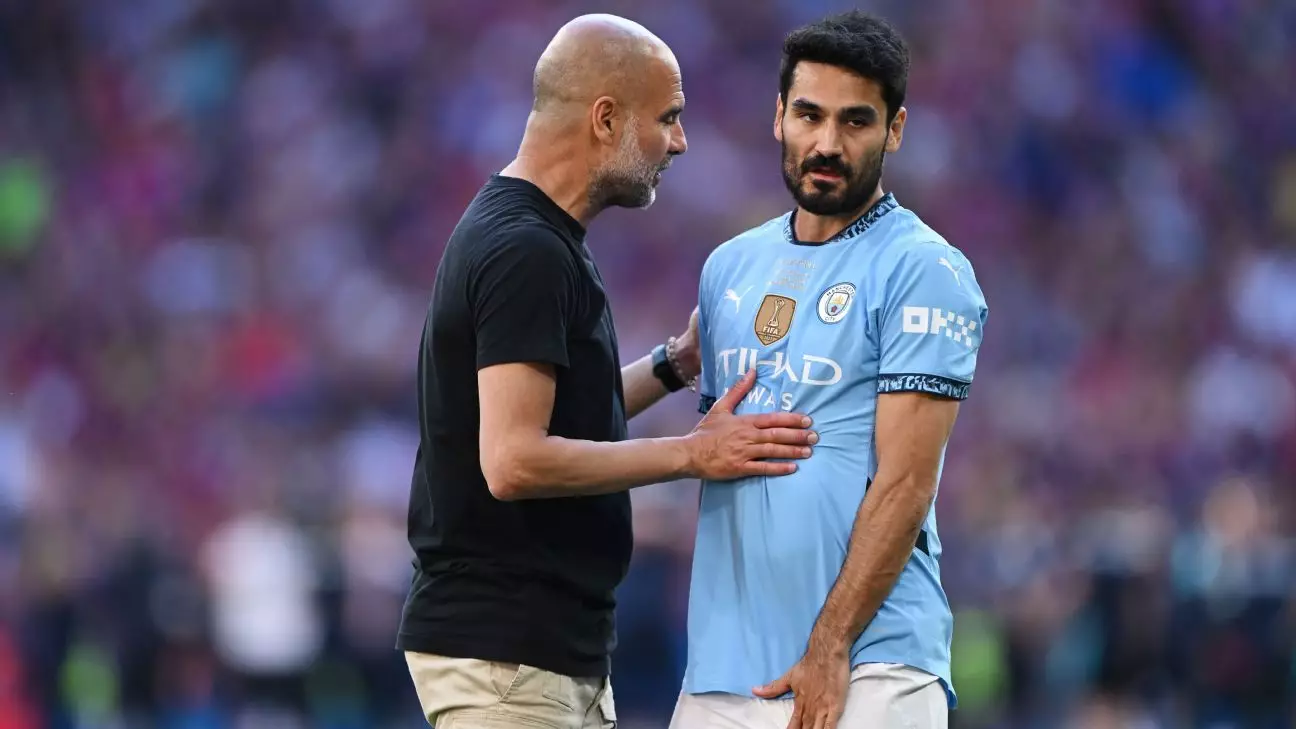As the football season approaches, the dynamics of squad management play a crucial role in team performance. Pep Guardiola, known for his meticulous approach to coaching, acknowledges this and is taking proactive steps to avoid the pitfalls that come with an oversized squad. His recent statements about wanting to trim the Manchester City roster reflect a deep understanding of team morale and the importance of player happiness. This isn’t merely a tactical move; it’s an effort to cultivate an atmosphere where every player feels valued and engaged.
Guardiola’s candid assertion that he would “quit” if faced with an unwieldy squad is not just hyperbole—it emphasizes his commitment to creating an environment conducive to both individual and collective success. No manager wants to send players into the season knowing that some will languish on the bench, unhappy and unfulfilled. Maintaining a squad of around 20 outfield players and three goalkeepers, as Guardiola prefers, speaks volumes about his philosophy: quality over quantity. Each player must feel they have a significant role, or the essence of teamwork dissipates.
The Pressures of New Signings
With the arrival of new talents like Rayan Cherki and Tijjani Reijnders, alongside seasoned players such as Ilkay Gündogan, there is naturally a competitive reshuffling. These new additions represent a double-edged sword: while they can elevate the team’s capabilities, they also exacerbate the challenge of fitting everyone into the first-team picture. The immediate future for some players appears precarious, especially with the looming transfer window and the knowledge that not everyone can remain. For instance, Gündogan faces increased competition with a burgeoning midfield, suggesting that hard decisions are on the horizon.
These high-stakes dynamics could lead to emotional turbulence, as players may find themselves grappling with the threat of reduced playing time or being cast aside altogether. It raises an essential question in modern football management: how do you strike the right balance between ambition and empathy? Guardiola’s insight into the emotional needs of his players is commendable, as it prioritizes loyalty and unity. The underlying concern he expresses—that players may become “sad” or “disappointed”—demonstrates that he values their human side, not just their athletic capabilities.
Strategic Communication and Future Uncertainties
In football, strategies aren’t only executed on the pitch; they also manifest in management’s communication regarding player futures. Guardiola’s remarks about not being in touch with Gündogan on his contract situation could be seen as a deliberate method to downplay speculation while maintaining focus on the present. However, this approach places uncertainty at the forefront—creating anxiety among players who are keen to understand their standing within the squad.
Such uncertainties can negatively impact team morale, presenting a paradox where the pursuit of excellence through squad improvement can inadvertently lead to unrest. For players like Gündogan, whose long-term future is clouded by speculation linking him to clubs like Galatasaray, clarity is essential. As the transfer window remains open, players will be on edge, and Guardiola must deftly navigate these waters to ensure that the atmosphere remains conducive to performance.
The Need for Action Amidst Procrastination
While Guardiola’s recognition of the need to trim the squad is a step in the right direction, the timeline for action remains critical. His acknowledgment that “we have a long time” before the window closes is a statement of patience but also indicates a potential danger of delaying crucial decisions. If the squad remains bloated for too long, it might lead to disillusionment among players, which can have lasting effects on team cohesion.
Consider this: the transfer window’s closing deadline applies pressure, and how Guardiola handles it will reveal not only his strategic capacity but also his emotional intelligence as a leader. The balance of sportsmanship and personal empathy is vital during these negotiations, as every player’s experience contributes to the overall success of the team. It’s a reminder that in football—much like in life—timing can be everything.
Guardiola’s insight into the complexities of squad management shines a light on the broader themes of emotional wellbeing in sports. By recognizing the need for a streamlined squad, he demonstrates his dedication to creating a supportive and high-performing environment, one that champions both the collective aspirations of Manchester City and the individual ambitions of its players. This approach could serve as a blueprint for other clubs striving to cultivate success without sacrificing the humanity of the game.

Leave a Reply